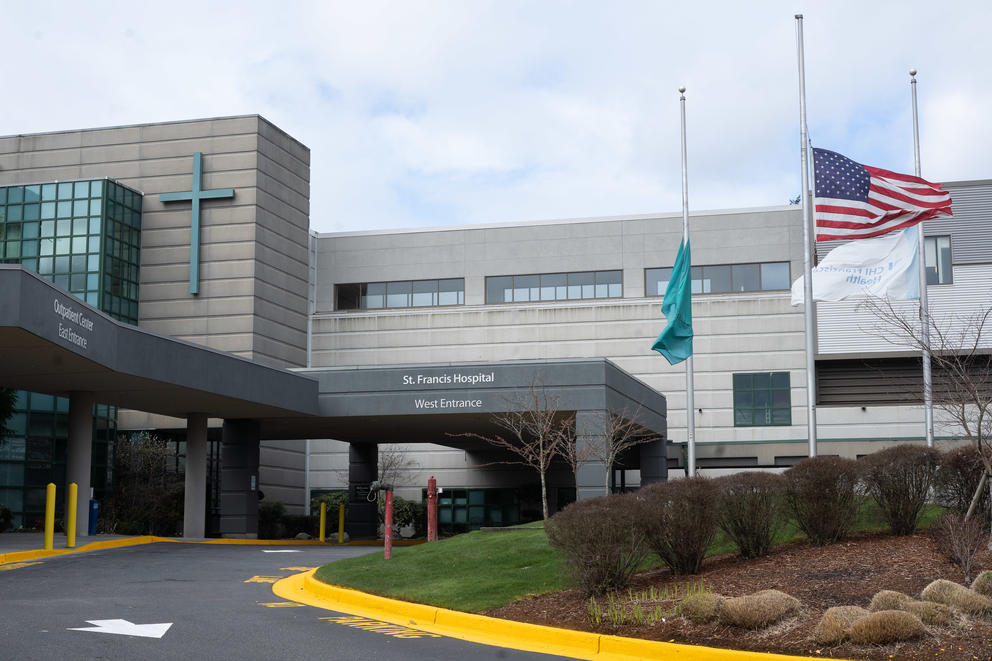Supporters of Senate Bill 5140, the Protecting Pregnancy Act, point to dramatic instances when women nearly died or were turned away from emergency rooms because medical staff didn’t believe they were permitted to perform abortions.
The bill would not require hospitals to provide elective abortions. Church-owned hospitals, which provide two-fifths of the hospital beds in Washington state, also could continue to restrict access to contraception, fertility treatments and sterilization.
InvestigateWest is a Seattle-based nonprofit newsroom producing journalism for the common good. Learn more and sign up to receive alerts about future stories at http://www.invw.org/newsletters/.
Republican opponents of the bill have decried it as a “Trojan horse” for an expansion of elective abortions, while asserting it attempts to address a health problem that doesn’t exist. Even without any Republican support, however, the bill has passed the state Senate and is moving through the House.
“For my friends on the other side of the aisle, this is really about a woman’s right to choose. That’s not what it’s about for me,” said prime sponsor state Sen. Patty Kuderer, D-Bellevue. “It’s about making sure women are given appropriate and necessary medical care when they need it, and protecting doctors who make that call.”
The bill is aimed at the care given to people with life-threatening, nonviable pregnancies, and those experiencing ectopic pregnancies, in which an embryo lodges in such a way that it will not be viable and can cause sterilizing and life-threatening injuries.
Caitlin Lombardi knows firsthand how important a full range of medical options can be when a pregnancy goes all wrong — as hers did six years ago.
Lombardi was four months pregnant when her water broke. Tragically in her case, this meant the fetus inside her would never breathe outside the womb — and the unviable pregnancy could kill Lombardi or leave her infertile. Her Seattle doctor swiftly terminated the pregnancy.
“The worst day of my life could’ve been so much worse,” said Lombardi, a 39-year-old nonprofit worker now living on Bainbridge Island. “It really opened my eyes. … There’s a whole range of reasons why someone would need an abortion that have nothing to do with an accidental pregnancy.”
The same doctor who ended that pregnancy also delivered Lombardi’s first child in 2016. And Lombardi, who has advocated for Kuderer’s bill in Olympia, just welcomed her third daughter five weeks ago.
Lombardi wonders if she would have been able to have a family had the doctor’s hands been tied by religiously motivated proscriptions.
Caitlin Lombardi and her husband, Tony, play games with their three daughters in their Bainbridge Island home on March 24, 2021. Lombardi is advocating for the Protecting Pregnancy Act in Olympia, which would allow doctors at Catholic hospitals to provide medically necessary abortions. The bill is currently moving through the state House after passing in the Senate. (Dorothy Edwards/Crosscut)
Hospital’s ethics panel
Seeds for the legislation were sown eight years ago, when a Bellingham woman nearly died of a blood infection caused by a nonviable pregnancy that hospital staff refused to terminate.
In 2013, Alison — the name used in a 2019 Rewire.News account — was in and out of the PeaceHealth St. Joseph Medical Center’s emergency room four times in less than a week. She was bleeding heavily and needed surgery to end her much-desired pregnancy.
Rather than act, Alison’s doctor waited on a hospital ethics commission. As Alison’s mother, Lin Skavdahl, recalled, her daughter was pale and writhing.
The young woman ended up miscarrying in a bathroom, “a horribly traumatic event that probably ended up saving her life,” said state Sen. Manka Dhingra, D-Redmond.
There has been no complete accounting of pregnant people who, in situations like Alison’s, were forced to wait on decisions from hospital ethics committees or drive to another hospital. But a report released by the American Civil Liberties Union of Washington in January collected anecdotes from patients and doctors that the legislation’s proponents contend indicate there is a substantial problem.
“When it comes to pregnancy complications, one of the really difficult things is that you often need care immediately,” said Leah Rutman, an ACLU of Washington policy attorney who has worked on the issue for seven years. “There are a significant number of hospitals in Washington state that limit care.”
Washington’s religiously affiliated hospitals acknowledge in statements filed with the state Department of Health that they don’t provide sterilization, birth control, some fertility treatments or elective abortions. They assert doctors can terminate pregnancies if medically necessary.
“Catholic hospitals follow the same standard clinical protocols that all providers utilize when an embryo cannot come to term and will cause infection or even death for the mother if not treated,” said Brian Reardon, a spokesperson for the Catholic Health Association of the United States.
Republicans argue patients not endangered
Many of the bill’s Republican opponents dispute the notion that religious restrictions are putting patients at risk. Several pointed out that a 2019 state Department of Health review of pregnancy-related deaths between 2014 and 2016 did not find any caused by the kinds of delayed care targeted in the legislation.
On the Senate floor, Sen. Ann Rivers, R-La Center, described the Protecting Pregnancy Act — “a warm and fuzzy title that actually contains a Trojan horse”— as a response to a “supposed problem.”
“The testimony offered by the folks showing up could not describe one encounter as described in this bill,” Rivers said during a Feb. 17 debate just before the Senate passed the measure on a party-line vote. “No one testified that it had happened, not a provider and not a patient.”
Testifying weeks earlier before a Senate committee on which Rivers sits, Dr. Annie Iriye, an Olympia OB-GYN, had described in detail the reprimand she received for hastening an increasingly ill patient’s miscarriage.
Iriye’s patient was five months pregnant and in active labor. Her water had already broken. As the doctor described it, the woman knew she would have to deliver a fetus that would not survive.
“She was actively miscarrying, and there was no way to save her pregnancy,” Iriye told the Senate Health & Long Term Care Committee on Jan. 20.
When the patient’s labor stalled, Iriye ordered Pitocin, a drug widely used to speed labor. According to Iriye’s account, the nurses told her she couldn’t do so while a fetal heartbeat could still be detected. By the time Iriye persuaded the head nurse to proceed, the patient had a fever and needed intravenous antibiotics.
“I was reprimanded for my actions, for providing the right care,” Iriye said. “This is contrary to our Hippocratic oath, to do no harm.”
During a March hearing, Dr. Jennifer Chin described a mother of two who was forced to pile her family into the car for an overnight drive to Seattle because no hospital in Spokane would treat her after she began miscarrying. Her doctors in Spokane couldn’t intervene until the fetus’s heart stopped, despite the mother’s rising risk of serious illness.
Chin, a Seattle physician who, like Iriye, spoke in support of the bill for the American College of Obstetricians and Gynecologists, said doctors “often” are unable to provide treatment mandated by their professional standards because of hospital rules.
“It’s important that we, as physicians, are able to treat patients as we see fit and are able to follow evidence-based guidelines,” Chin told the House Committee on Health Care & Wellness.
Dr. Erin Berry said that about two pregnant people arrive each month at Western Washington Planned Parenthood clinics after being turned away from hospitals that restrict care for miscarriages and nonviable pregnancies.
“We’re seeing it all the time,” said Berry, Washington state medical director of Planned Parenthood of the Great Northwest and the Hawaiian Islands.
Berry described an instance in which a Planned Parenthood patient known to have an ectopic pregnancy arrived at the emergency room of a Seattle hospital — Berry wouldn’t say which — only to be sent home, where her Fallopian tube ruptured. Such an injury can lead to infertility, illness or death.
Part of the problem, Berry said, is that health care providers don’t know what restrictions are in place. Rather than risk their careers by conducting an abortion, they refuse to provide treatment.
Having practiced reproductive health care in Georgia for a decade before arriving in Washington three years ago, Berry said she was surprised to find patients with life-threatening pregnancy complications regularly being sent home.
“I never struggled as a provider [in Georgia] with sending people to ERs,” Berry said. “I never feared that they’d get turned away like this.”
‘It was all about killing the bill’
Religious restrictions are becoming increasingly common in Washington hospitals. A series of acquisitions during the past decade has meant about 41% of hospital beds in the state are operated by Catholic Church-owned health care corporations.
A January merger of CHI Franciscan and Virginia Mason was expected to leave Bellingham, Centralia and Walla Walla without any secular hospitals. Yakima avoided that state of affairs after Yakima Valley Memorial Hospital broke away from Virginia Mason just before the merger.
Kuderer said the mergers “added urgency” to her efforts. Legislation introduced by Sen. Emily Randall, D-Bremerton, to increase state oversight over hospital mergers stalled in committee this session; Randall expects to reintroduce the bill next session.
The Washington State Hospital Association, the trade group in Olympia representing hospitals, opposes the bill. Chelene Whiteaker, the association’s senior vice president for government affairs, said the legislation is unnecessary.
“There are already other mechanisms in place to ensure patients get the right care, in the right place, at the right time,” Whiteaker said by email.
Whiteaker argued that hospitals sometimes refer patients to other, more appropriate sites for treatment, often to outside clinics.
“Many of the stories told by this bill’s proponents are heartbreaking, and we absolutely want to ensure all patients are able to get the care they need, which is why our state’s medical community works collaboratively,” Whiteaker said. “Different sites are best equipped to respond to different types and acuity of care.”
The hospitals had been negotiating with legislators for years before Kuderer filed the bill in January. Her frustration evident, Kuderer said the hospitals had no interest in resolving anything.
“From my perspective, negotiating with the hospitals was a lot like negotiating a gun bill with the NRA,” Kuderer said. “There was no genuine interest in compromise. It was all about killing the bill.”
The hospitals and Republican opponents object to provisions in the bill that would enable patients to sue if they believe they’ve been denied care, and for health care providers to do the same if they’re reprimanded for providing it. Kuderer described the provision as the legislation’s “teeth.”
An impassioned Senate debate in February saw several senators recount moments in their own lives when they needed emergency care after their pregnancies ran into trouble.
From the Senate floor, Republicans cast the legislation as overly broad and offered amendments that would have enumerated the specific medical conditions when an abortion could be performed. Several also expressed suspicion that the bill would be stretched to force religious hospitals to sanction abortion.
“I am very, very concerned that this is the next step to forcing clinics” to perform abortions, said Sen. Judy Warnick, R-Moses Lake, vice chair of the Republican Caucus. “I think this is the next step toward it.”
Kuderer said her opponents were “making the bill about something that it’s not,” an attack on religious liberty.
“I’m all for religion, but I don’t think it belongs in the hospital room and I don’t think it should be put between a doctor and his or her patient,” the senator said by phone. “Freedom of religion, that’s personal to you. It’s the right to express your faith. I don’t think you have the right to practice your faith on someone else.”
The Protecting Pregnancy Act is currently before the House Rules Committee. Kureder said she expects it to receive a hearing in coming days.










